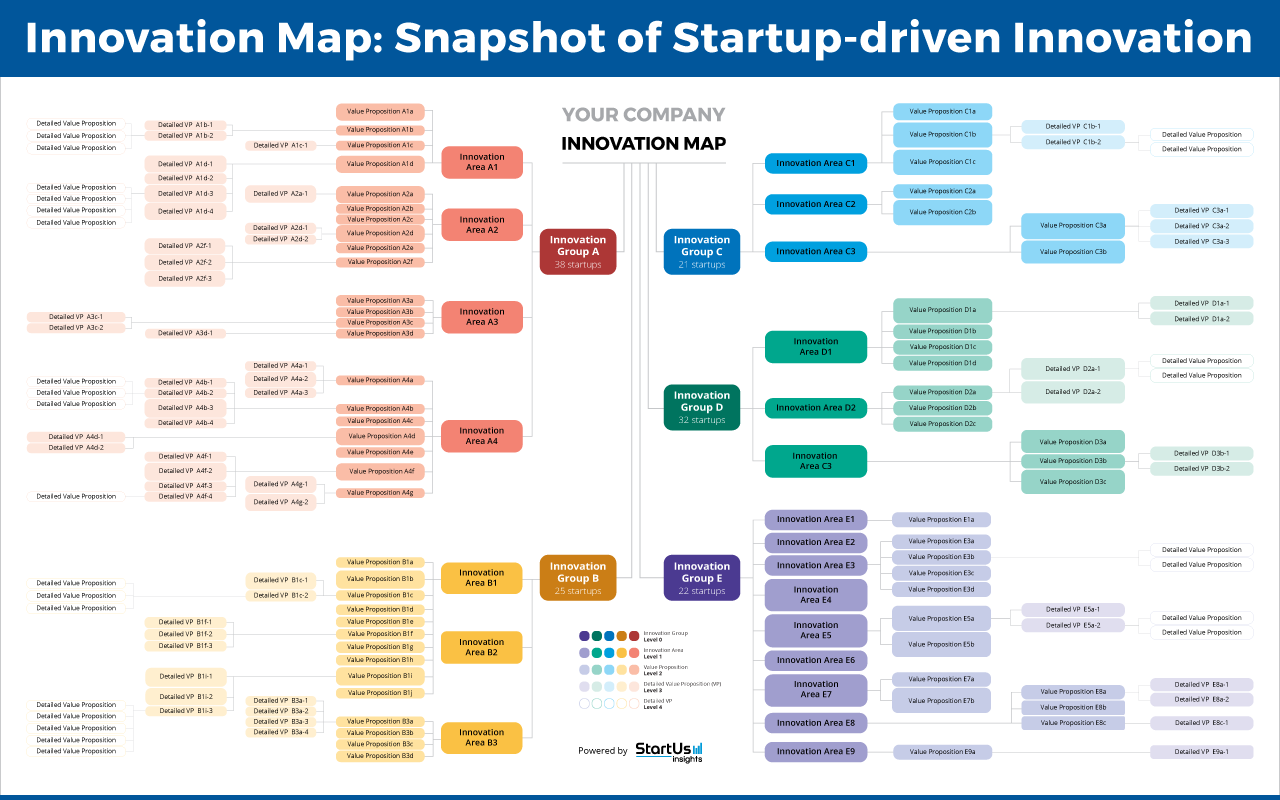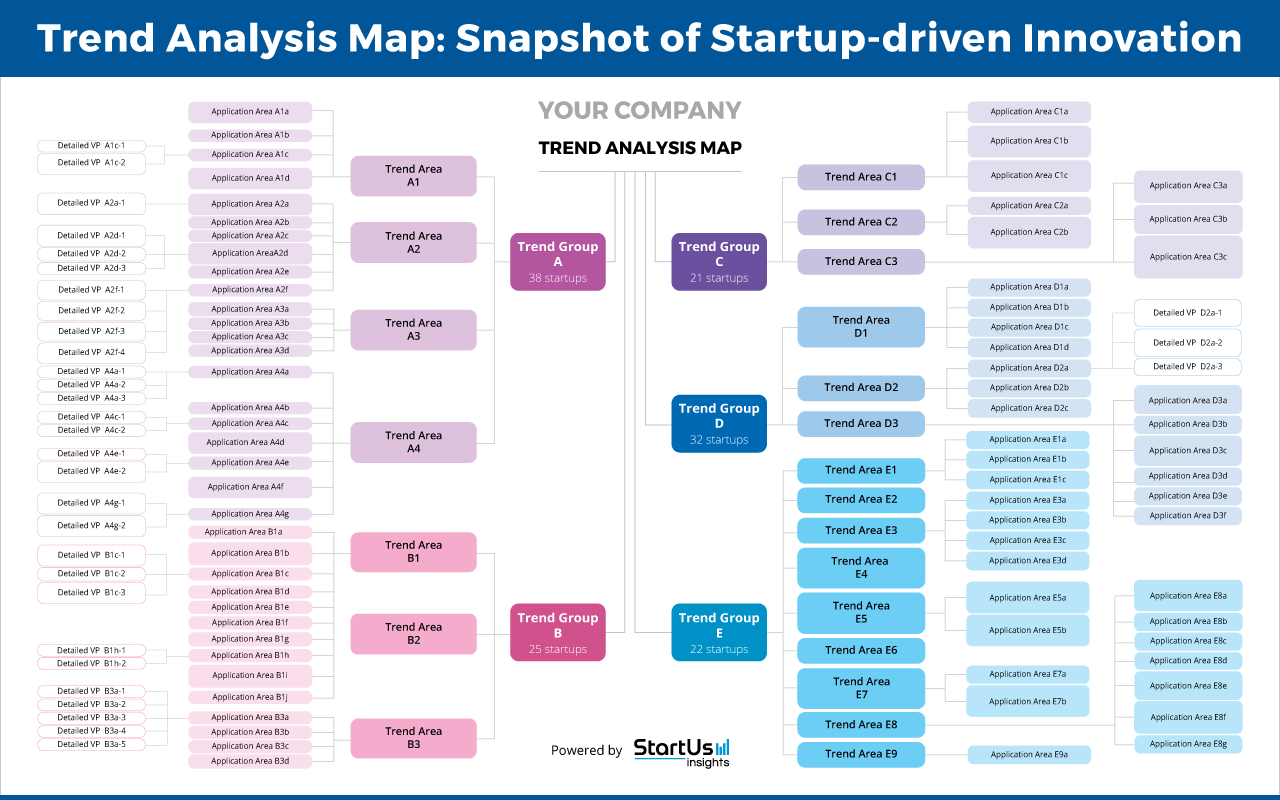Large corporations often move slow and are therefore at risk of being outdone by emerging startups and scaleups. As a hedge against this and to promote innovation, companies increasingly seek to partner with external agents such as startups. Data-driven startup scouting allows them to achieve this. As part of innovation management, startup scouting is the process of identifying startups and scaleups that can support an organization’s innovation goals through onboarding them as vendors, partnerships, or acquisitions (build, partner, buy strategy).
But with startup activity rising exponentially, startup scouting is an incredibly difficult task. To give you an idea of the scale of the challenge, know that literally hundreds of thousands of new startups were launched in 2022 alone according to our data. To make things easier for you, we outline a 5-step approach on the right way to scout startups in 2023:

Data-driven startup scouting scans the entire landscape of startup-driven innovation to find the right startups for your innovation goals.
Scout Startups: A Comprehensive 5-Step Guide
1. Identify Your Innovation Goals
What worked for an automotive company 10 years back doesn’t work for an automotive company now. What works for a utility company now doesn’t work for a manufacturing company. This means your innovation strategy needs to balance your ambitions with the current reality of your industry. Companies that fail to do this end up burning a lot of money on technologies and trends that don’t pan out.
However, setting up an open innovation strategy is difficult. Companies need to break it down to identifying macro and micro innovation goals. The former could be becoming a market leader, launching a range of products, or beating the competition. The latter includes objectives like efficiency improvements and production optimization. More importantly, innovation goals should be quantifiable, customer-focused, and be objective in their impact on value creation.
2. Cast a Wide Net
Traditionally, companies discovered startups to work with at industry conferences or other in-person events. Today, innovation is more distributed than ever before and any company that limits itself to the traditional approach misses important innovations happening elsewhere on the globe. Usually, startup scouting casts a wide net that allows you to discover startups beyond your region and from other industries as well. However, due to the large number of startups out there, manual desk research is ineffective, inefficient, and increasingly expensive.
On the contrary, data-driven startup scouting quickly scans the entire global startup ecosystem. This saves time spent on weeks of desk research, provides relevant results fast, and offers an exhaustive list of potential partners. For instance, the StartUs Insights Discovery Platform instantly searches through over 2,5 million startups and scaleups globally to find the ones that best match your innovation goals.
3. Identify Potential Partners
Even after filtering based on your needs, there will be dozens or even hundreds of startups for you to pick from. How do you pick the best among them when there is a time constraint? Although not an exhaustive list, asking these questions allows you to considerably narrow your search:
- Which startup’s technology stack complements your internal capabilities?
- Is the startup’s technology novel? If yes, how long would it take before it can be incorporated into your products and services?
- How easy is it to scale the startup’s technology with your infrastructure?
- Do the startup’s solutions fulfill both your micro and macro innovation needs?
- Other than technology, does the startup bring tangible benefits to your internal innovation teams?
4. Evaluate the Best Way to Engage with Startups
After identifying potential partners, the next step is to devise a strategy on how to engage with them. Collaboration between startups and companies is the backbone of the open innovation process. There are different kinds of partnerships that make this happen. For instance, a company could outright decide to acquire the startup, with or without its leadership. Or the company may choose to invest in the startup, thereby actively betting on the technology it’s developing. Perhaps more common is onboarding the startup as a vendor, either purchasing the startup’s products or licensing its technology in the process.
Going beyond these partnerships, some companies run startup programs or corporate accelerators to continuously find and nurture potential partners. This allows companies to build a reputation of being agile and establish a competitive advantage over their rivals. Moreover, betting on innovative startups earlier also maximizes their return on investment (ROI).
5. Regularly Scout Startups
Not all large companies can afford to run startup programs. In this case, startup monitoring is a more affordable and flexible alternative. Continuous monitoring of the startup ecosystem, including emerging technologies and trends, allows companies to stay up-to-date at all times. Moreover, it improves performance benchmarking of internal projects as well as enables accurate technology assessment. This is why companies must set aside a budget for innovation management practices in general and startup scouting in particular.
Scout the Right Startups for Your Innovation Goals
A data-driven approach takes the hassle out of identifying startups that best align with your innovation ambitions. It gives you actionable insights from billions of data points on startups of all shapes and sizes. Using Big Data & AI, the StartUs Insights Discovery Platform analyzes data on over 2,5 million global startups and scaleups developing emerging technologies.
Depending on your innovation goals and requirements, we offer a range of deliverables for your deep technology scouting process. Some of these include:
- Startup Database: Covers hundreds of relevant startups that match your innovation goals.
- Innovation Map: Visualizes emerging innovations and the startups that are driving them.
- Technology Report: Provides firmographic data and insights on highly relevant startups, scaleups, and the technologies they develop.

Startus Insights Discovery Platforms reveals different trends enabled by startup-driven innovation to ensure you stay updated.
To discover how we at StartUs Insights identify emerging startups that match your innovation agenda, we offer a free consultation. If you want to quickly find highly relevant startups, get in touch today!

![Packaging 4.0 : Top 9 Digital Transformation Technologies to Watch [2025]](https://www.startus-insights.com/wp-content/uploads/2025/02/Packaging-4.0-SharedImg-StartUs-Insights-noresize-420x236.webp)
![AI and Business: A Strategic Guide for Industry Leaders & Corporates [2025-2030]](https://www.startus-insights.com/wp-content/uploads/2025/02/AI-and-Business-SharedImg-StartUs-Insights-noresize-420x236.webp)





